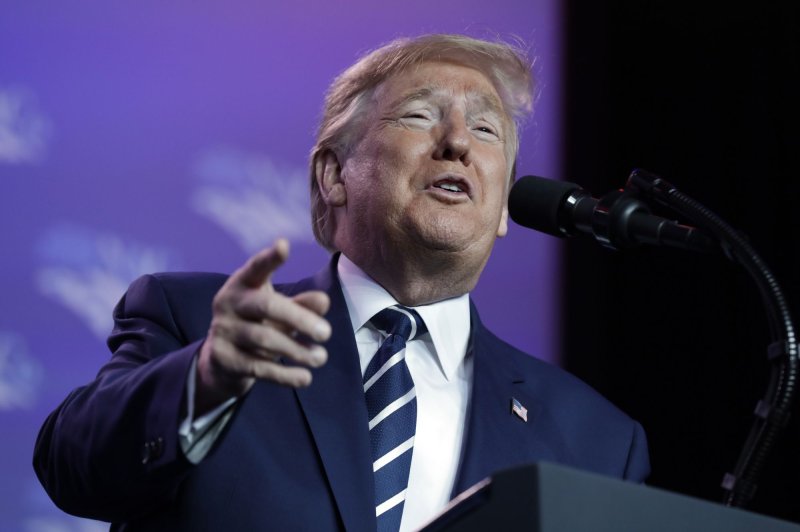President Donald Trump delivers remarks at the National Association of Counties Legislative Conference in Washington, D.C. on Tuesday as his administration works on the response to the coronavirus outbreak. Photo by Yuri Gripas/UPI |
License Photo
In August 2005, Hurricane Katrina struck America's Southeast. New Orleans was especially hard hit, much of it demolished by floods. Over 1,700 people died. And George W. Bush's administration was rightly pilloried because of the lack of preparation and anticipation of the annual recurrence of hurricanes.
Is the new coronavirus, COVID-19, a potential Katrina on steroids, with potentially tectonic political, economic, social and health consequences?
Diseases and pandemics have little in common with hurricanes except to the degree each is an act of nature. Hurricanes are visible, and human damage is avoidable by evacuation. Pathogens are invisible, and quarantine or avoidance of contaminated areas is usually insufficient to stem further outbreaks. The spread, rate, duration and lethality of COVID-19, along with the time it takes to develop vaccines and cures, are unknown. Worse, disease plays on psychological reactions of impotence and vulnerability to infection.
Fear, worry and even panic are predictable outcomes. To counter these, politicians must display competence and confidence in communicating with public. These "3 Cs" are vital. Second, gaining full knowledge and understanding of this virus is an urgent priority. Third, national, regional and local response plans must be put in place to include worst-case contingencies. Finally, the federal government must have a credible crisis management team in place.
In the worst case, the stakes could be existential for tens or hundreds of thousands and even millions of people. The Middle Age black plagues killed possibly a third or half of England's population. The Spanish flu of 1918-20 claimed between 20 million and 100 million lives globally. Fortunately, the more recent brushes with H1N1 flu, anthrax and Ebola never turned into pandemics. However, growing up in New York City in the late 1940s and early 1950s, polio raised fear in virtually every household until Jonas Salk produced his vaccine.
So far, the virus is not yet a technical pandemic. That will likely change as the disease is highly contagious and expands globally. The good news is that COVID-19 appears not to be as fatal as SARS. About 80 to 85 percent of those who are infected show no or relatively minor symptoms. The fatality rate is estimated at about 2 percent, less than many cancers.
By comparison, about 100,000 Americans die annually from the flu, drug overdoses and related issues. A similar number die from firearms, including suicides and all accidents. Yet, fear and uncertainty often consume rationality. The United States has not yet arrived at this position. But it might.
Other major dangers are economic and financial. In an era of globalization, supply and demand are inextricably intertwined. As Chinese production of goods and vital items in the supply chain falters, this has global impact. As fewer people are likely to consume goods, demand likewise falls. Ironically then, the contagion of the virus infects the world economy.
Extreme political polarization will infect the perception of how this virus is handled. First, to inspire trust and confidence, President Donald Trump's record in speaking the truth is unhelpful. Can the president's word be accepted?
The president was off to a bad start in his first comments. That said, to promote confidence, no president would overstate the possible dangers until absolutely certain. Playing down the catastrophic side of pandemics makes sense if it is done responsibly, even if no one knows whether this virus will degrade in warmer weather.
Putting the vice president in charge of any national effort is common, no matter which party is in power. However, given the partisan divides and genuine questions about Mike Pence's management and organizational skills, his appointment has drawn fire. The reality is that this administration is in charge. It must rely on the people who staff it at least through Jan. 20, 2021.
Confidence, competence and communications are essential to good governance, particularly in crisis. A pandemic or potential pandemic will stress the limits of governments in responding effectively. Fortunately, this virus so far seems less deadly than the 1918-20 Spanish flu, given lower mortality rates. Yet COVID-19 is frightening nonetheless.
That an invisible virus could eradicate trillion of dollars in stock values in a week is a further sign of its destructive potential without killing hundreds of thousands or even millions. Come November, how this disease is contained, and how it evolves could make the difference in who is elected president and which parties control both houses of Congress. And of course, how many people contract or succumb to the disease will be the ultimate mark of political success or failure.
One other worry: Given this virus warning, is climate change lurking as the next crisis? If so, how well prepared are we for that?
Harlan Ullman is a senior adviser at the Atlantic Council. His latest book is "Anatomy of Failure: Why America Has Lost Every War It Starts." Follow him @harlankullman.















